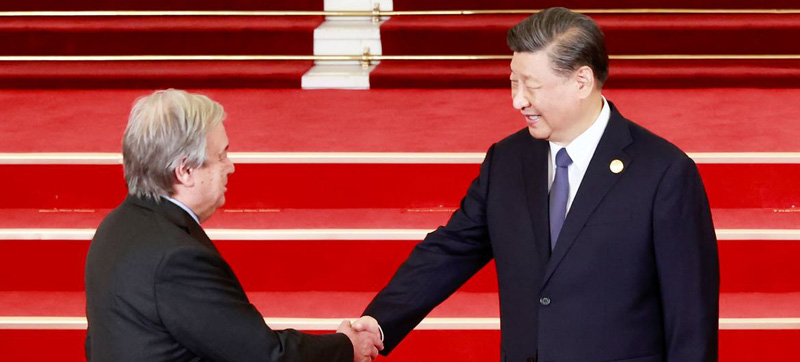Guterres: Turn ‘infrastructure emergency’ into opportunity, but also protect nature

Infrastructure is a “crucial pathway” to generate economic growth, create decent jobs, transform energy systems, and advance sustainable development, the UN Secretary-General said in an address to world leaders meeting in Beijing, China on Wednesday.
António Guterres was speaking at the third international forum on China’s Belt and Road initiative, which has funded and built roads, power plants, bridges, ports and other facilities across developing countries over the past decade.
Although infrastructure “is the foundation of everyday life for people and economies”, Mr. Guterres recalled that billions in the developing world still lack access to basic systems.
Crisis and opportunity
“This infrastructure crisis comes as people are facing a cauldron of challenges across our efforts to advance peace, sustainable development and human right,” he said. .
He urged leaders to “turn the infrastructure emergency into the infrastructure opportunity,” noting that 75 per cent of the infrastructure the world will need by mid-century has not been built yet.
“The Belt and Road Initiative recognizes that we have a historic opportunity to build modern, green cities, communities and transportation and power systems that place resilience and sustainability at the heart,” he said, adding that it can make valuable contributions in two key areas of action.
Support economic sustainability
The first focuses on advancing economic sustainability in developing countries through reform of the current global financial architecture, promoting effective debt-relief mechanisms and supporting a $500 billion annual Stimulus Plan to scale-up investment in the Sustainable Development Goals (SDGs).
Leaders attending the SDG Summit at UN Headquarters last month endorsed these initiatives.
“Now, in this context, a dramatic context for the developing countries, the relevance of the Belt and Road Initiative is undeniable. It has included nearly $1 trillion in cumulative investments across more than 3,000 projects around the world,” he said.
Invest in environmental sustainability
The second area for action concerns advancing environmental sustainability, which will require investments that “embed resilience and adaptation across national and local planning” and help meet the goal of limiting global temperature rise to 1.5 degrees above pre-industrial levels.
“The Belt and Road Initiative is an important instrument to make such key investments a reality,” he said.
Green Silk Road
The Secretary-General addressed this point in remarks to a high-level forum on the Green Silk Road initiative, aimed at putting Belt and Road projects and investments in harmony with nature.
Their scale, number and scope “can literally change landscapes — economies, energy systems, transportation, buildings and entire industries”, he said, “and this must be done in ways that preserve our children’s future”.
Mr. Guterres urged leaders “to ensure that projects deliver the green, sustainable infrastructure countries need to support people and ecosystems alike, while breaking free of failed development models that keep us hooked on fossil fuels.”
Again, he saw two key areas where investments can help boost efforts towards sustainability and climate action.
Clean energy for all
First, he underscored the need for “green transportation and municipal power systems” that do not pollute the environment or destroy biodiversity while providing affordable electricity for all.
“We need building and construction industries taking their impacts on nature into account across their plans and projects,” he added. “We need buildings and water and power-systems that are climate-resilient and able to continue serving communities in the face of disaster.”
Abandon fossil fuels
Additionally, any new infrastructure investment must “turbocharge the transition away from planet-wrecking fossil fuels towards renewable energy” – his second point.
In this regard, Mr. Guterres recalled his proposal for a Climate Solidarity Pact that pushes major emitters to slash greenhouse gas emissions. Similarly, his Acceleration Agenda urges all governments to “hit fast-forward on their energy transitions.”
The UN chief stressed the need to deliver the $100 billion commitment to support climate action in developing countries, to double adaptation finance by 2025, and operationalize the loss and damage fund at the COP28 climate conference in Dubai next month.
He also recalled his appeal to end the licensing of new oil and gas projects, scrap fossil fuel subsidies, and exit coal by 2040.
“The Green Silk Road can be a critical part of this process to fast-track a fair, equitable and just energy transition, as we bring clean and affordable power to all and travel true net-zero pathways,” he said.



